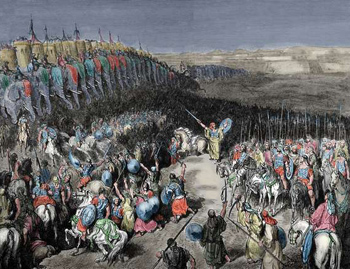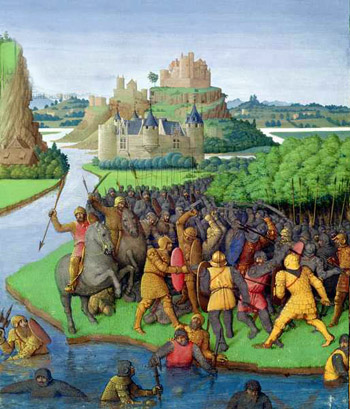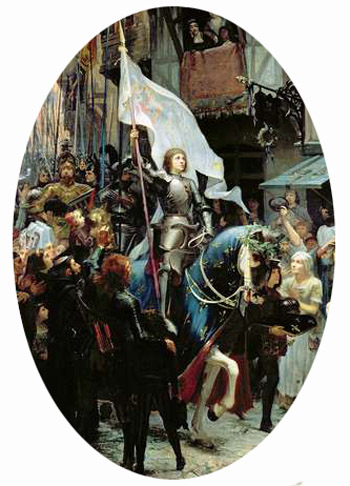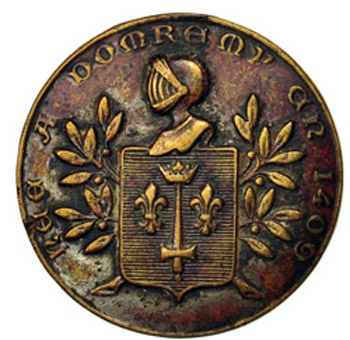Personalities
 |
 |
 |
 |
 |
 |
 |
The Epopee of St. Joan of Arc - I
The Heroic Example of the Maccabees
This past July (1956) we commemorated a centenary of St. Joan of Arc. Indeed, on July 7, 1456, the ecclesiastical sentence that rehabilitated St. Joan of Arc was published. Five hundred years later, the world again pays tribute to the Maid of Orléans.
Today we turn our attention more particularly to the universal meaning of this centenary. St. Joan of Arc, as the paladin of the independence of France, received a due homage from all of Christianity, because the nation of the Franks has the inalienable right to be the eldest daughter of the Church. Moreover, the heroine of Orléans admirably symbolizes the virtue of militancy and fearlessness, something our era neither understands nor appreciates.
Thus, this centenary does raise a debate over a topic infested with the liberal prejudices of our time: What are we to make of the use of force and violence to combat evil? Before the overwhelming torrent of iniquity the contemporary world faces, would it not be better for us to look after our personal spiritual lives and leave to Divine Providence the rendering of accounts with the evil?
Should we not, from a duty of charity, stop resisting these evil persons with energetic actions, but instead overcome them by pardoning their injuries and practicing patience, humility, resignation and passivity? In the face of the uncertainties of war – which is a tremendous scourge for men – should we not prefer peace at all costs, even in the case of aggression, following the evangelical counsel that tells us to turn the other cheek to our enemies? (Mt 5:39)
In response to todays’s communist-pagan onslaughts, the practical and theoretical attitude of large sectors of Catholic opinion is nothing but concession.
What the modern world is forgetting is that passiveness in the face of evil can constitute a crime. Thus, for example, St. Thomas taught that, “although bearing with injuries against ourselves is a virtuous act, bearing with injuries against God is the apex of impiety.” (Summa Theologiae, IIa, IIae, q. 136, a. 4, ad 3) Invoking the testimony of St. Augustine, the same Doctor added: “The evangelical precepts of patience are not opposed to the good of the State; on this account, in order to ensure this good it is a duty to combat our enemies.” (apud ibid.)
St. Paul denounced the superficial prescriptions of the Pharisees (cf. Col 2: 16-23) and their misrepresentations of evangelical morality as “Jewish fables” (Tit 1:14) and the “doctrines of devils” (1 Tim 4:1) that destroy the principle of social and religious authority. These errors give teachers of doctrine infected with Manichaeism a pretext to isolate themselves in a false spiritualism, despising all human means to conquer evil as “carnal.”
To employ human means is not to dismiss divine help, quite the opposite. Even if we are useless servants, God uses men as instruments of His omnipotent will and His wise designs during our pilgrimage on this earth. The important thing for us, consequently, is to conform all our acts to the sovereign will of God, known through Natural Law and Revelation.
The resistance of the Maccabees
Let us look at the example of the Maccabees. In the 2nd century BC, the spirit of the people of Israel had been infiltrated by a pagan Hellenism, which undermined their strength and made them fall into the power of the Syrian Greeks. This could have been an occasion for the Jews to deliver themselves passively to a vilifying yoke. However, something else happened.
The Maccabees rose up as the instruments chosen by God and broke the chains of that oppression. “And they pursued the children of pride, and the work prospered in their hands: And they recovered the law out of the hands of the nations [gentiles], and out of the hands of the kings: and they yielded not the horn (1) to the sinner.” (1 Mac 2:47)
 In those days the Jewish high priest Mattathias saw the evils that were being done to the people of Judah and was consumed with grief, “and his reins trembled.” (2) Faced with the apostasy of a Jew who was preparing to sacrifice to the idols over the altar of the victorious pagans, “his wrath was kindled according to the judgment of the law.” (2:24)
In those days the Jewish high priest Mattathias saw the evils that were being done to the people of Judah and was consumed with grief, “and his reins trembled.” (2) Faced with the apostasy of a Jew who was preparing to sacrifice to the idols over the altar of the victorious pagans, “his wrath was kindled according to the judgment of the law.” (2:24)
Mattathias killed the apostate and ran away to the mountains with his allies. Later on, he was succeeded by his son Judas Maccabeus, who, with his four brothers, continued the resistance. “And he got his people great honor, and put on a breastplate as a giant, and girt his warlike armor about him in battles, and protected the camp with his sword.” (3:3)
Furthermore: “He pursued the wicked and sought them out, and them that troubled his people he burned with fire: And his enemies were driven away for fear of him, and all the workers of iniquity were troubled: and salvation prospered in his hand.” (3:5-6)
Did Judas Maccabeus try to please everyone? Certainly not. Far from seeking peace at any price, he was set upon redressing the offenses made to God and to his persecuted brothers. “And he grieved many kings, and made Jacob glad with his works, and his memory is blessed forever.” (3:7)
 Now then, no one will deny that the Maccabees employed human means to fight the evil. How can we act otherwise in the conditions in which God places us? Consequently, the wise thing is not to despise the human means available to us, but to raise them to the supernatural level. If we must have confidence in God in every act of our life, how much more should we confide in Him in those dramatic, stormy moments when we must fight for good and justice?
Now then, no one will deny that the Maccabees employed human means to fight the evil. How can we act otherwise in the conditions in which God places us? Consequently, the wise thing is not to despise the human means available to us, but to raise them to the supernatural level. If we must have confidence in God in every act of our life, how much more should we confide in Him in those dramatic, stormy moments when we must fight for good and justice?
Seeing themselves so inferior in numbers, the allies of Judas Maccabeus addressed him before a battle with these words: “How shall we, being few, be able to fight against a multitude so great and so strong, and we are ready to faint with fasting today?” (3:17)
He responded: “It is an easy matter for many to be shut up in the hands of a few: for there is no difference in the sight of the God of Heaven to deliver with a great multitude or with a small company: For the success of war is not in the multitude of the army, but strength comes from heaven.” (3:18-19)
Thus were the Maccabees the instruments of God to save Israel in a critical moment of its History. In this respect, we must note that God chooses not only individuals, but also nations, for different missions in order to fulfill the designs of His Divine Providence.

Continued

Today we turn our attention more particularly to the universal meaning of this centenary. St. Joan of Arc, as the paladin of the independence of France, received a due homage from all of Christianity, because the nation of the Franks has the inalienable right to be the eldest daughter of the Church. Moreover, the heroine of Orléans admirably symbolizes the virtue of militancy and fearlessness, something our era neither understands nor appreciates.
Thus, this centenary does raise a debate over a topic infested with the liberal prejudices of our time: What are we to make of the use of force and violence to combat evil? Before the overwhelming torrent of iniquity the contemporary world faces, would it not be better for us to look after our personal spiritual lives and leave to Divine Providence the rendering of accounts with the evil?
Should we not, from a duty of charity, stop resisting these evil persons with energetic actions, but instead overcome them by pardoning their injuries and practicing patience, humility, resignation and passivity? In the face of the uncertainties of war – which is a tremendous scourge for men – should we not prefer peace at all costs, even in the case of aggression, following the evangelical counsel that tells us to turn the other cheek to our enemies? (Mt 5:39)
In response to todays’s communist-pagan onslaughts, the practical and theoretical attitude of large sectors of Catholic opinion is nothing but concession.
What the modern world is forgetting is that passiveness in the face of evil can constitute a crime. Thus, for example, St. Thomas taught that, “although bearing with injuries against ourselves is a virtuous act, bearing with injuries against God is the apex of impiety.” (Summa Theologiae, IIa, IIae, q. 136, a. 4, ad 3) Invoking the testimony of St. Augustine, the same Doctor added: “The evangelical precepts of patience are not opposed to the good of the State; on this account, in order to ensure this good it is a duty to combat our enemies.” (apud ibid.)
St. Paul denounced the superficial prescriptions of the Pharisees (cf. Col 2: 16-23) and their misrepresentations of evangelical morality as “Jewish fables” (Tit 1:14) and the “doctrines of devils” (1 Tim 4:1) that destroy the principle of social and religious authority. These errors give teachers of doctrine infected with Manichaeism a pretext to isolate themselves in a false spiritualism, despising all human means to conquer evil as “carnal.”
To employ human means is not to dismiss divine help, quite the opposite. Even if we are useless servants, God uses men as instruments of His omnipotent will and His wise designs during our pilgrimage on this earth. The important thing for us, consequently, is to conform all our acts to the sovereign will of God, known through Natural Law and Revelation.
The resistance of the Maccabees
Let us look at the example of the Maccabees. In the 2nd century BC, the spirit of the people of Israel had been infiltrated by a pagan Hellenism, which undermined their strength and made them fall into the power of the Syrian Greeks. This could have been an occasion for the Jews to deliver themselves passively to a vilifying yoke. However, something else happened.
The Maccabees rose up as the instruments chosen by God and broke the chains of that oppression. “And they pursued the children of pride, and the work prospered in their hands: And they recovered the law out of the hands of the nations [gentiles], and out of the hands of the kings: and they yielded not the horn (1) to the sinner.” (1 Mac 2:47)

Judas Maccabee leads a battle against Nicamor with his multitude of troops
Mattathias killed the apostate and ran away to the mountains with his allies. Later on, he was succeeded by his son Judas Maccabeus, who, with his four brothers, continued the resistance. “And he got his people great honor, and put on a breastplate as a giant, and girt his warlike armor about him in battles, and protected the camp with his sword.” (3:3)
Furthermore: “He pursued the wicked and sought them out, and them that troubled his people he burned with fire: And his enemies were driven away for fear of him, and all the workers of iniquity were troubled: and salvation prospered in his hand.” (3:5-6)
Did Judas Maccabeus try to please everyone? Certainly not. Far from seeking peace at any price, he was set upon redressing the offenses made to God and to his persecuted brothers. “And he grieved many kings, and made Jacob glad with his works, and his memory is blessed forever.” (3:7)

The great Greek general Bacchides is subdued by the Maccabees
Seeing themselves so inferior in numbers, the allies of Judas Maccabeus addressed him before a battle with these words: “How shall we, being few, be able to fight against a multitude so great and so strong, and we are ready to faint with fasting today?” (3:17)
He responded: “It is an easy matter for many to be shut up in the hands of a few: for there is no difference in the sight of the God of Heaven to deliver with a great multitude or with a small company: For the success of war is not in the multitude of the army, but strength comes from heaven.” (3:18-19)
Thus were the Maccabees the instruments of God to save Israel in a critical moment of its History. In this respect, we must note that God chooses not only individuals, but also nations, for different missions in order to fulfill the designs of His Divine Providence.

- Footnote in Douay Rheims: ‘They yielded not the horn”: That is, they suffered not the power of Antiochus, that man of sin, to abolish the law and religion of God.
- Reins literally means “kidneys;” here this expression – ”his reins trembled” – means that Mattathias had a great internal commotion and he became indignant.

First published in Catolicismo, July 1956
Posted June 11, 2018
Posted June 11, 2018
______________________
______________________
 Volume I |
 Volume II |
 Volume III |
 Volume IV |
 Volume V |
 Volume VI |
 Volume VII |
 Volume VIII |
 Volume IX |
 Volume X |
 Volume XI |
 Special Edition |




